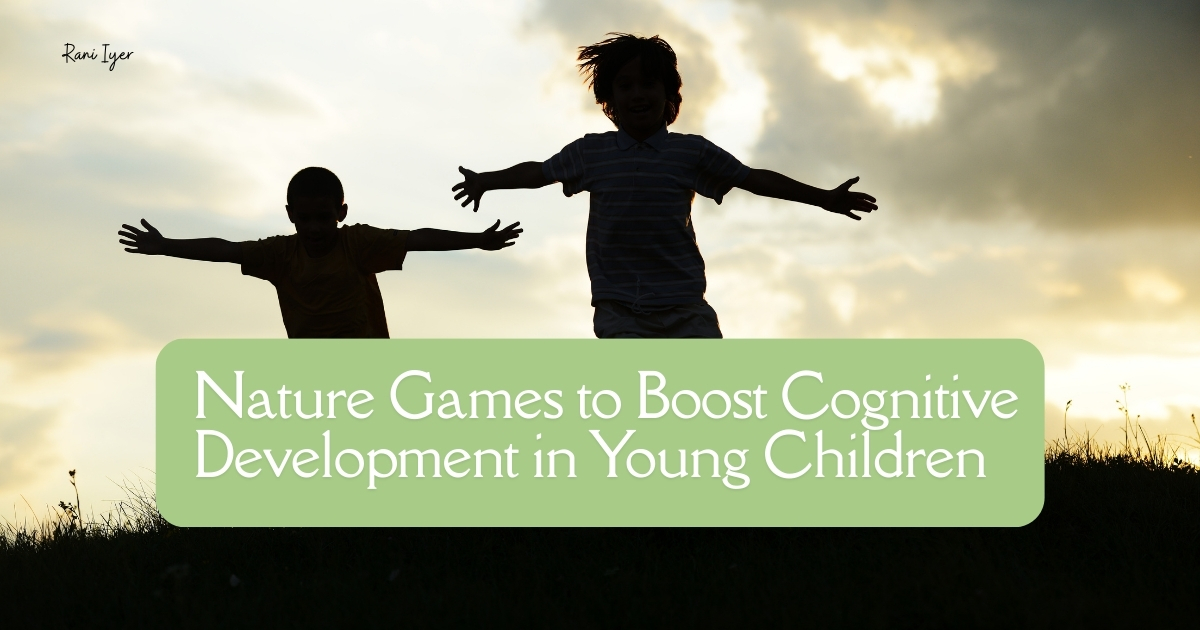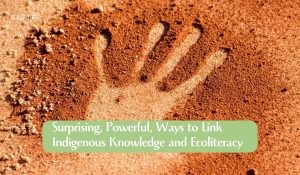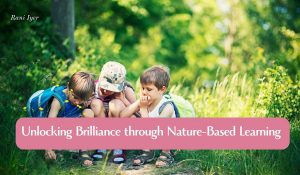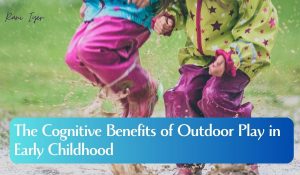Nature has always been a magical playground for children, stimulating their imagination and nurturing their cognitive development. In a world dominated by screens and technology, it is more important than ever to encourage young minds to connect with the natural environment. With a plethora of benefits, nature games offer an immersive and interactive way for children to explore their surroundings while fostering brain development.
In this article, we will unveil five nature games that not only provide endless fun but also boost cognitive development in young children. From scavenger hunts that enhance problem-solving skills to sensory activities that promote sensory integration and spatial awareness, these games are designed to engage all the senses, encouraging children to think critically, make decisions, and develop important cognitive skills.
By incorporating these games into their daily routine, parents and educators can provide children with opportunities to develop their cognitive abilities while enjoying the wonders of nature. So, come with us as we unleash the power of imagination and delve into the world of nature games that will leave a lasting impact on your child’s cognitive development.
The importance of cognitive development in young children
Cognitive development is a crucial aspect of a child’s overall growth and well-being. It encompasses the process of acquiring and processing information, problem-solving, decision-making, and the ability to think critically. During the early years, the brain undergoes rapid development, laying the foundation for a child’s future academic success, social skills, and emotional intelligence.
As children explore their world, they are constantly absorbing new information, making connections, and building a deeper understanding of their surroundings. This cognitive development is essential for children to develop their language skills, memory, attention, and reasoning abilities. When children are provided with engaging and stimulating experiences, they are more likely to develop strong cognitive skills that will serve them well throughout their lives.
Investing in activities that foster cognitive development in young children is crucial, as it lays the groundwork for their future academic and personal achievements. By nurturing their curiosity, problem-solving abilities, and critical thinking skills, we can empower children to become confident, adaptable, and successful individuals. Encouraging cognitive development during the formative years is a valuable investment that will pay dividends for years to come.
The benefits of outdoor play for cognitive development
Outdoor play is a powerful tool for promoting cognitive development in young children. When children engage with the natural environment, they are presented with a wealth of sensory experiences that stimulate their brains and encourage exploration, discovery, and problem-solving.
Being in nature allows children to engage in unstructured, imaginative play, which is essential for the development of cognitive skills. As they navigate the outdoors, children must make decisions, plan their actions, and adapt to changing environments. This process of active engagement fosters the development of executive function skills, such as working memory, cognitive flexibility, and inhibitory control.
Furthermore, outdoor play encourages children to observe, question, and make connections between the natural world and their own experiences. This process of inquiry and discovery is fundamental to the development of critical thinking and problem-solving abilities. When children are given the freedom to explore and experiment in nature, they are more likely to develop a deeper understanding of the world around them, which can translate to improved academic performance and a lifelong love of learning.
Nature games that promote imagination and creativity
Incorporating nature games into a child’s daily routine can have a profound impact on their cognitive development. These activities not only provide endless fun and enjoyment but also serve as powerful tools for nurturing imagination, creativity, and critical thinking skills. By engaging with the natural world through these games, children can develop a deeper understanding of their environment, enhance their problem-solving abilities, and cultivate a lifelong appreciation for the wonders of nature.
Game 1: Nature scavenger hunt
Nature scavenger hunts are a classic outdoor activity that encourage children to explore their surroundings and engage in problem-solving. By creating a list of items or observations to find in the natural environment, children are prompted to use their senses, make observations, and think critically about their environment.
As children search for the items on their list, they must navigate their surroundings, identify patterns and textures, and make connections between the different elements they encounter. This process of active exploration and discovery helps to develop cognitive skills such as attention, memory, and spatial awareness. Additionally, the sense of accomplishment and pride that children feel when they successfully locate the items on their list can boost their self-confidence and motivation to continue learning and exploring.
To further enhance the cognitive benefits of a nature scavenger hunt, parents and educators can incorporate additional challenges, such as asking children to describe the items they find, compare and contrast different elements, or even create a story based on the items they discover. By incorporating these elements, the scavenger hunt becomes a multi-faceted activity that engages children’s minds and encourages them to think critically about their surroundings.
Game 2: Nature sensory exploration
Sensory exploration is a powerful tool for promoting cognitive development in young children. By engaging their senses, children can develop a deeper understanding of the natural world and build connections between their experiences and the information they are processing.
In a nature sensory exploration activity, children are encouraged to use all of their senses – sight, sound, touch, smell, and even taste (with appropriate supervision) – to investigate the various elements of the natural environment. This could involve touching the bark of a tree, listening to the sounds of birds, or smelling the fragrance of flowers.
As children engage in these sensory experiences, they are actively building neural pathways in their brains, which can enhance their memory, attention, and problem-solving skills. Additionally, the process of making observations and drawing connections between the different sensory inputs can foster critical thinking and cognitive flexibility. By encouraging children to describe their experiences and share their findings, parents and educators can further reinforce the cognitive benefits of this nature-based activity.
Game 3: Nature storytelling
Storytelling is a powerful tool for cognitive development, and incorporating nature into the process can be particularly engaging and enriching for young children. By using the natural world as a backdrop for their stories, children can tap into their imagination, develop their language skills, and cultivate important cognitive abilities such as sequencing, problem-solving, and creative thinking.
In a nature storytelling activity, children can be encouraged to observe their surroundings and then use those observations to create their own narratives. This could involve imagining the lives of animals, describing the changes in a particular landscape over time, or weaving a fantastical tale inspired by the elements of nature. As children share their stories, they are exercising their verbal communication skills, organizing their thoughts, and making connections between their experiences and the world around them.
To further enhance the cognitive benefits of nature storytelling, parents and educators can prompt children with questions, encourage them to consider different perspectives, or challenge them to incorporate specific elements of the natural environment into their narratives. By engaging in this process, children can develop their language skills, improve their memory and attention, and cultivate their ability to think creatively and problem-solve.
Game 4: Nature art and craft
Engaging in nature-inspired art and craft activities can be a powerful way to foster cognitive development in young children. By using natural materials and elements as the basis for their creations, children can tap into their creativity, develop fine motor skills, and gain a deeper understanding of the world around them.
Whether it’s creating leaf rubbings, constructing nature collages, or designing sculptures using twigs and stones, these activities encourage children to observe, experiment, and make connections between the natural world and their own artistic expression. As children manipulate the materials, they are developing their hand-eye coordination, problem-solving abilities, and spatial awareness.
Furthermore, the process of creating art and crafts inspired by nature can stimulate children’s imaginations and promote critical thinking. By asking children to explain their creations, describe their creative process, or even incorporate storytelling elements, parents and educators can further enhance the cognitive benefits of these nature-based activities.
Game 5: Nature role-playing
Role-playing in a natural environment can be a highly engaging and cognitively stimulating activity for young children. By immersing themselves in imaginative scenarios inspired by the natural world, children can develop their language skills, enhance their decision-making abilities, and cultivate their problem-solving skills.
For example, children might take on the role of different animals, exploring their habitats, behaviors, and adaptations. Or they might imagine themselves as explorers, navigating through a forest, discovering new species, and facing various challenges. These types of role-playing activities not only encourage children to use their creativity and imagination but also require them to think critically, make decisions, and problem-solve in response to the scenarios they encounter.
To further support the cognitive development of children engaged in nature role-playing, parents and educators can provide prompts, ask thought-provoking questions, and encourage children to reflect on their experiences. By doing so, they can help children make connections between their imaginative play and the real-world concepts and skills they are developing, such as spatial awareness, perspective-taking, and logical reasoning.
Tips for incorporating nature games into daily routines
Integrating nature games into a child’s daily routine can be a highly effective way to promote cognitive development and foster a lifelong appreciation for the natural world. Here are some tips to help parents and educators incorporate these activities seamlessly into their daily lives:
- Embrace the outdoors: Make a conscious effort to spend more time outdoors, whether it’s a daily walk, a visit to a local park, or a weekend hike. This exposure to the natural environment will provide ample opportunities to engage in nature-based activities and games.
- Adapt activities to your environment: The beauty of nature games is that they can be tailored to fit any outdoor setting, from a backyard to a city park. Be creative and find ways to incorporate the natural elements available in your surroundings.
- Involve children in planning: Encourage children to help choose and plan the nature games they want to play. This will foster a sense of ownership and investment in the activities, making them more engaging and meaningful.
- Encourage observation and exploration: Encourage children to use their senses to observe and explore the natural world around them. Ask questions that prompt them to think critically and make connections.
- Incorporate technology thoughtfully: While nature games are designed to reduce screen time, you can selectively use technology to enhance the experience, such as using a nature identification app or taking photos to document their discoveries.
- Make it a family affair: Engage the whole family in nature games and activities. This collaborative approach can create lasting memories and reinforce the importance of connecting with the natural world.
- Celebrate the process, not just the outcome: Focus on the joy of exploration, discovery, and creative expression rather than the end result. This will help children develop a growth mindset and a love for learning.
By following these tips, parents and educators can seamlessly integrate nature games into children’s daily routines, fostering cognitive development, imagination, and a deep appreciation for the natural world.
The power of nature games in fostering cognitive development
In a world where technology and screens often dominate children’s daily lives, it is more important than ever to nurture their connection with the natural environment. Nature games offer a powerful and engaging way to do just that, providing young children with opportunities to explore, discover, and develop critical cognitive skills.
Through activities like nature scavenger hunts, sensory explorations, storytelling, art and craft, and role-playing, children can engage their senses, problem-solve, think creatively, and build a deeper understanding of the world around them. These nature-based games not only spark imagination and creativity but also lay the foundation for academic success, social-emotional development, and a lifelong appreciation for the natural world.
By incorporating these nature games into their daily routines, parents and educators can empower children to become confident, adaptable, and curious learners. As children navigate the wonders of the natural environment, they will develop essential cognitive skills, such as attention, memory, problem-solving, and critical thinking, that will serve them well throughout their lives.
Unleashing the power of nature games is a simple yet profound way to nurture the cognitive development of young children. By fostering a deep connection with the natural world, we can inspire them to become engaged, curious, and passionate learners, poised to make a positive impact on the world around them.
🌿Unlock the Power of Human-Nature Connection! 🌿
Imagine stepping into a world where nature isn’t just a backdrop but a key to unlocking your best self. Our quarterly newsletter invites you on a journey to rediscover the countless ways human-nature interactions can nurture your mind, body, and soul.
🌱 Stay Inspired: Dive into stories, tips, and practices that bring you closer to nature, one simple step at a time.
🌄 Expand Your Perspective: Explore fascinating insights on the science behind nature’s impact on well-being, resilience, and happiness.
✨ Exclusive Content: Get special updates, upcoming events, and inspiration directly in your inbox—no spam, just meaningful content tailored to your interests.
Join our community and let nature empower your journey! Sign up today and take the first step toward a more balanced, inspired life.




